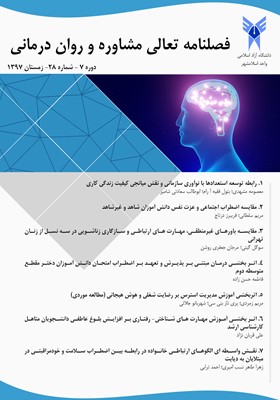اثربخشی آموزش مدیریت استرس بر رضایت شغلی و هوش هیجانی (مطالعه موردی)
محورهای موضوعی : فصلنامه تعالی مشاوره و روان درمانیمریم زمردی 1 , پری ناز بنی سی 2 * , شهربانو جلائی 3
1 - کارشناس ارشد روان شناسی عمومی ، دانشگاه آزاد اسلامی، واحد تهران غرب ،تهران، ایران
2 - استادیار دانشگاه آزاد واحد تهران غرب ، تهران، ایران
3 - استادیار دانشگاه آزاد واحد تهران غرب ،تهران، ایران
کلید واژه: هوش هیجانی, رضایت شغلی, مدیریت استرس, کارکنان شرکت کارگزاری بورس اوراق بهادار,
چکیده مقاله :
مقدمه: پژوهش حاضر به دنبال سنجش اثربخشی آموزش مدیریت استرس بر رضایت شغلی و هوش هیجانی کارکنان شرکت کارگزاری بورس اوراق بهادار بود. روش: برای این منظور25 نفر از کارکنان یک شرکت کارگزاری به عنوان نمونه تحقیق انتخاب شده و مورد سنجش استرس شغلی، با استفاده از پرسشنامه استرس شغلی اسپیلبرگر، رضایت شغلی، با استفاده از پرسشنامه رضایت شغلی مینه سوتا، و هوش هیجانی، با استفاده از پرسشنامه بار-آن، قرار گرفتند. پس از یک دورهی آموزش مدیریت استرس، مجدداً متغیرهای یادشده در بارهی ایشان مورد سنجش قرار گرفت. دادههای جمع آوری شده، توسط نرم افزار اکسل تبدیل به بانک اطلاعاتی شد و خلاصه آنها در نرم افزار اس.پی.اس.اس مورد تجزیه و تحلیل آماری قرار گرفت. یافته ها: نتیجه آزمون نرمال بودن دادهها با آزمون شاپیرو ویلک نشان داد که دو متغیر استرس شغلی و رضایت شغلی دارای تابع توزیع نرمال هستند اما متغیر هوش هیجانی از توزیع نرمال برخوردار نیست. نهایتاً برای آزمون فرضهای آماری در بارهی دو متغیر اول از آزمون t برای نمونه زوجی و برای متغیر سوم از آزمون ویلکاکسون استفاده شد. نتیجه حاصل از آزمون فرضیهها، اثربخشی آموزش مدیریت استرس بر کاهش استرس شغلی و افزایش رضایت شغلی را تأیید کرد اما اثربخشی این آموزش بر هوش هیجانی کارکنان مورد تأیید قرار نگرفت. اثر متغیر تعدیلگر سن با استفاده از آزمون فرضیات در دو نمونه پایینتر و بالاتر از 30 سال صورت گرفت. اثر بخشی آموزش مدیریت استرس بر رضایت شغلی و هوش هیجانی در نمونه زیر 30 سال تأیید و در نمونه بالای 30 سال رد شد. در هر دو نمونه، اثربخشی آموزش مدیریت استرس بر کاهش سطح استرس شغلی تأیید شد. نتیجه گیری : آموزش مدیریت استرس بر رضایت شغلی و هوش هیجانی کارکنان شرکت کارگزاری بورس اوراق بهادار اثربخش بوده است.
Introduction: The present study sought to measure the effectiveness of stress management training on job satisfaction and emotional intelligence of the employees of the stock exchange brokerage firm. Method: For this purpose, 25 employees of a brokerage firm were selected as the sample of the research and assessed by occupational stress, using Spielberger Job Stress Questionnaire, job satisfaction, using the Minnesota Job Satisfaction Questionnaire, and Emotional Intelligence, using Bar-it questionnaire. After a stress management training period, again, the variables mentioned were measured. Collected data was converted to Excel by Excel software and analyzed by SPSS software. Results: The results of the normalization of data with Shapiro-Wilk test showed that two variables of occupational stress and job satisfaction have normal distribution function, but the emotional intelligence variable does not have normal distribution. Finally, for testing the statistical assumptions about the first two variables, t test was used for the paired sample and for the third variable, Wilcoxon test was used. The results of the hypothesis test confirmed the effectiveness of stress management training on reducing job stress and increasing job satisfaction, but the effectiveness of this training on the emotional intelligence of the staff was not confirmed. The effect of the age moderator variable was obtained using the hypothesis test in two samples below and above 30 years. The effectiveness of Stress Management Training on job satisfaction and emotional intelligence was confirmed in a sample below 30 years of age and rejected in a sample over 30 years of age. In both samples, the effectiveness of stress management training was confirmed on the reduction of occupational stress level. Conclusion: Stress management training has been effective on job satisfaction and emotional intelligence of the employees of stock exchange brokerage firm.
_||_

